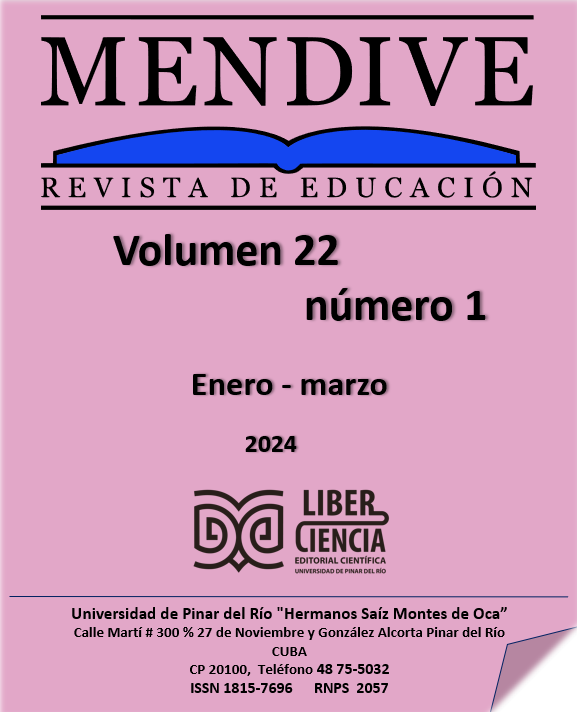Ubiquity of learning and rubric in new students of a public university
Main Article Content
Abstract
Education received incidence of the use of information technologies during the beginning of the pandemic. The objective was to describe the ubiquity of learning and the use of the rubric in the academic products elaborated by new students in a Peruvian public university. Likewise, the ubiquity of learning required that the new university students elaborate products mainly using ICTs, therefore, the rubrics had an impact on the virtual evaluations. The research had a descriptive level, ex post facto type and case study modality. The materials used were the rubrics elaborated from the need to evaluate ubiquitous learning. The method of analysis was statistical analysis. The research was carried out without conflicts of interest as informed consent was obtained. Among the main results, it is evidenced that students and teachers use virtual tools to strengthen learning, the grades were above the average, in novice university students. Among the conclusions, the changes in the teaching-learning process are highlighted, which were noticeable both for the teacher and especially for the students.
Downloads
Article Details

This work is licensed under a Creative Commons Attribution-NonCommercial 4.0 International License.
References
Altamirano, S., Méndez, A., & Rojas, M. (2022). Beneficios del uso de la rúbrica en la enseñanza-aprendizaje del diseño. Zincografía, 6(11), 228-244. https://doi.org/10.32870/zcr.v6i11.136
Díaz-García, I., Almerich, G., Suárez-Rodríguez, J. y Orellana, N. (2020). La relación entre las competencias TIC, el uso de las TIC y los enfoques de aprendizaje en alumnado universitario de educación. Revista de Investigación Educativa, 38(2), 549-566. http://dx.doi.org/10.6018/rie.409371
Díaz-Garay, B., Noriega-Araníbar, M., & Ruiz-Ruiz, M. (2021). Experiencias y desafíos en la formación de ingenieros durante la pandemia de la covid-19. Desde el Sur, 13(2), e0019. https://dx.doi.org/10.21142/des-1302-2021-0019
Holzer, J., Lüftenegger, M., Korlat, S., Pelikan, E., Salmela-Aro, K., Spiel, C y Schober, B. (2021). La educación superior en tiempos de COVID-19: satisfacción de las necesidades básicas, aprendizaje autorregulado y bienestar de los estudiantes universitarios. AERA Abierto, 7(1), 113. DOI: https://doi.org/10.1177/23328584211003164
Ifedayo, A., Ziden, A. y Ismail, A. (2020). Mediating effect of behavioral intention on podcast acceptance. Educ. Inf. Technol. 1-28.
Lagos, G. y Garcés, E. (2020). Aplicación del U-learning en la educación superior del Ecuador frente al covid 19. INNOVA Research Journal, 5 (32), 19-32. DOI: https://revistas.uide.edu.ec/index.php/innova/article/view/1600
Morales, A., Zacatenco, J., Luna, M., García, R., & Hidalgo, C. (2020). Acceso y actitud del uso de Internet entre jóvenes de educación universitaria. Revista Digital de Investigación en Docencia Universitaria, 14(1), e1174. https://doi.org/10.19083/ridu.2020.1174
Muñoz, J., Espiñeira, E, y Pérez, M. (2021). Medidas para combatir el plagio en los procesos de aprendizaje. Educación XX1, 24 (2), 97-120. https://doi.org/10.5944/educXX1.28341
Pardo, H. y Cobo, C. (2020). Expandir la universidad más allá de la enseñanza remota de emergencia Ideas hacia un modelo híbrido post-pandemia. Outliers School. Barcelona. https://outliersschool.net/wp-content/uploads/2020/05/Expandir_la_universidad.pdf
Quintana, B., Parra, C. y Riaño, J. (2016). El podcast como herramienta para la innovación en espacios de comunicación universitarios. Anagramas, 15(30), 81-100. DOI: 10.22395/angr.v15n30a4
Velázquez, B., & López, R. (2021). Análisis crítico del concepto "aprendizaje ubicuo" a través de la Cartografía Conceptual. Revista de Educación a Distancia (RED), 21(66), 1-28. https://doi.org/10.6018/red.430841
Vendrell, M. & Rodríguez, J. (2020). Pensamiento Crítico: conceptualización y relevancia en el seno de la educación superior. Revista De La Educación Superior, 49 (194), 9-25. http://resu.anuies.mx/ojs/index.php/resu/article/view/1121
Vilela, P., Sánchez, J., & Chau, C. (2021). Desafíos de la educación superior en el Perú durante la pandemia por la covid-19. Desde el Sur, 13(2), e0016. https://dx.doi.org/10.21142/des-1302-2021-0016


